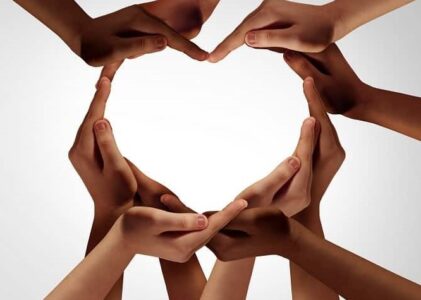How many times in the past few years have you wished you could unplug from the chaos surrounding you?
I remember thinking that I just wanted to get off the merry-go-round. I could not get a grip, a hold on anything. And I doubted everything.
When my wasband was having an affair, I knew it deep in my soul. Even though I knew it, I could not prove it. With no proof, I convinced myself that I was imagining it. But there was that niggling deep down that something was very wrong.
The thoughts that spun around in my mind were chaotic. I suffered. I suffered because I did not know what to believe, including myself. The questions assaulted me day and night. The how’s, the who’s, the what’s, the why’s. Even the question of “What did I do to cause this?”
The chaos leaked over from my mind into my life. At one point I felt completely immobilized. Then, the proof began to rise to the surface. I felt vindicated by the proof, but it did not quiet the chaos. A whole new onslaught of “stinking thinking” took over. I wanted off the merry-go-round and I wanted off NOW!
Chaos refers to a state of disorder, confusion, or unpredictability. It manifests in various forms, disrupting your sense of order and the stability that we look for.
For wounded women, emotional chaos is a prevalent aspect of our lives. This impact of trauma leads to a wide range of intense feelings such as fear, anxiety, anger, and deep sadness. These emotions can surface unexpectedly, contributing to our sense of internal turmoil.
Chaos can be triggered by unexpected events or reminders of past trauma. The unpredictable nature of these triggers adds an element of instability, making it challenging for you to predict and manage your emotional responses.
Chaos extends to all our relationships, with trust issues, difficulties in forming connections, and challenges in keeping healthy boundaries. The aftermath of trauma can affect the way wounded women engage with others, leading to interpersonal struggles and a sense of uncertainty in our social circles.
Wounded women grapple with the unknown, fearing what might come next. We have spent a lot of time trying to control the daily events of our lives, always predicting the worst-case scenario and planning what we would do when the bomb exploded. This uncertainty can further contribute to a sense of chaos in our lives, even when we are removed from the cause of our trauma. Do you feel unable to anticipate or control the challenges ahead?
Trauma shakes the foundations of our identity, leading to a profound loss of self. As wounded women we experience the sense of disconnection from who we once were, contributing to a state of existential chaos as we question our purpose, our values, and our place in the world.
Chaos is often cyclical, with one challenge leading to another. We may find ourselves caught in a loop of difficulties, each compounding the other. Breaking this cycle becomes crucial for restoring a sense of order and control.
Understanding the multifaceted nature of chaos is a crucial step in addressing and navigating the impact on our lives. By acknowledging and dissecting the different dimensions of chaos, we can begin to develop strategies for coping, healing, and reclaiming a sense of stability and purpose.
Within the chaos, there is the potential for healing and growth. The journey towards recovery involves navigating the complexities of trauma, facing challenges, and transforming pain into resilience. This dual nature highlights the absurd coexistence of chaos and potential renewal.
Acknowledging and harnessing this potential can empower you on your journey toward recovery. Let’s explore the ways which healing and growth can emerge amid chaos.
Imagine if you could build resilience as the cornerstone of your healing.
Chaos often unveils the natural resilience and strength within individuals. In navigating the complexities of our experiences, we discover an inner determination that allows us to face adversity head-on. This resilience becomes a cornerstone for our healing.
Each challenge inside the chaos offers us an opportunity to learn and grow. As we face difficulties we get new insights, skills, and perspectives. These lessons contribute to our personal development and resilience.
Think of a time when you said no when you usually would have said yes or maybe would have said nothing at all. These times showed you that the world did not fall apart when you took control of your thoughts, values and notions and stood up for yourself. This recognition shows you that you are strong.
How many times did you keep getting up and keep going, after hardship and misfortune? This shows that you are resilient.
The chaos following trauma prompts a deep exploration of our identity. Through introspection and self-discovery, we have the opportunity to redefine who we are. We get to shed old stories and embrace a more authentic sense of who we are. This process is fundamental to the healing journey.
The chaos of trauma often prompts existential questions. When we seek meaning and purpose, we embark on a journey of profound self-reflection. This quest for significance contributes to a sense of direction and clarity, fostering a deeper understanding of our life’s purpose.
Overcoming chaos nurtures a sense of empowerment. As we navigate and conquer challenges, we gain a newfound belief in our ability to overcome adversity. This empowerment becomes a catalyst for further growth.
Nothing causes the development of coping mechanisms more than chaos. In our quest for stability, we often discover healthy coping strategies. Strategies such as a mindfulness practice, creative outlets, or therapeutic interventions. These tools become essential for managing the impact of chaos.
Chaos tends to pull us into the hullabaloo of past traumas or anxieties about an uncertain future. Through mindfulness practices, wounded women can cultivate an awareness of the present moment. The benefit of mindfulness is the reduction of overwhelming emotions and the fostering of a sense of calm amid the chaos.
Healing is often helped through connections with others who understand and empathize. As wounded women we can find solace in support networks— with fellow survivors, friends, and family. Building and nurturing these connections becomes a source of emotional sustenance and shared strength.
Seeking professional help, with a focus on your outcome rather than a reminder of your past, can be a transformative step toward healing. Therapists provide guidance, tools, and a safe space for processing trauma, fostering growth, and facilitating the integration of coping mechanisms.
Chaos often involves significant change. Embracing change as a catalyst for personal transformation allows women to reshape their stories. This adaptability becomes a powerful force for positive change.
The potential for healing and growth during chaos lies in the resilience, self-discovery, empowerment, and connections that emerge through the journey of overcoming trauma. By recognizing and nurturing these aspects, wounded women can navigate the complexities of their experiences and move towards a future marked by strength, purpose, and renewed well-being. We believe that when a woman heals, the world is healed, one woman at a time.


